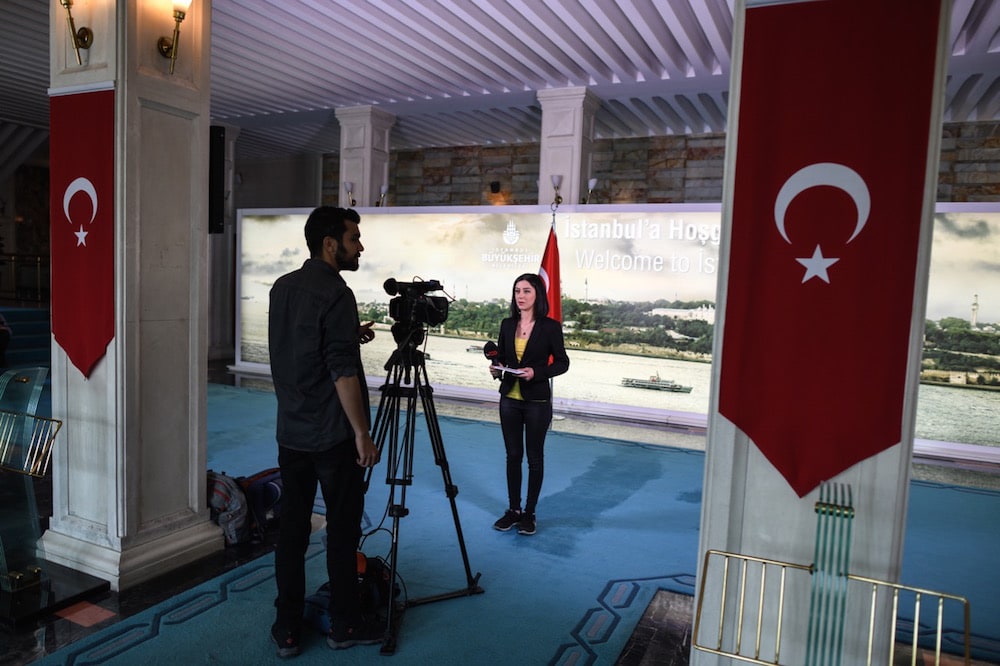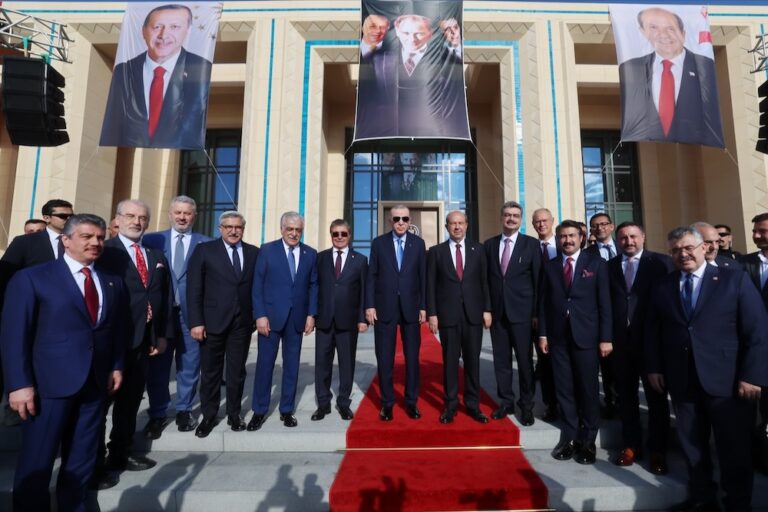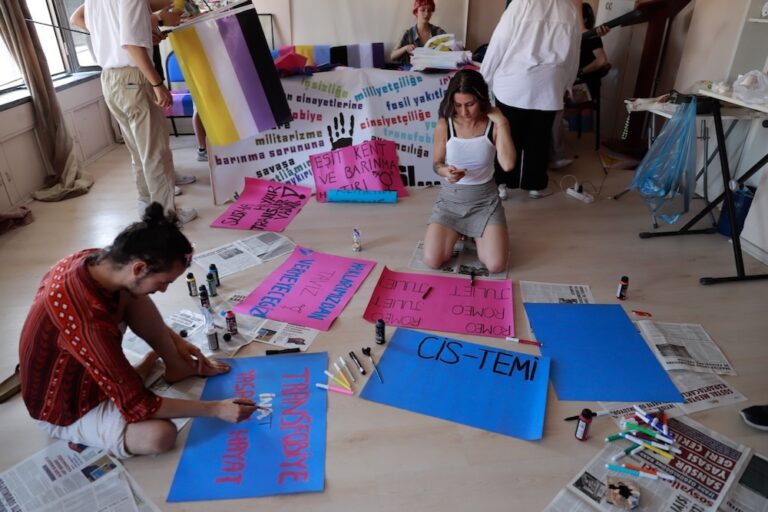Turkey’s broadcasting watchdog, the Radio and Television Supreme Council (RTÜK), has contributed to the deepening censorship of independent and critical broadcasting by imposing five-day broadcasting bans on two TV stations and heavy fines on others.
This statement was originally published on hrw.org on 15 December 2020.
Turkey’s broadcasting watchdog, the Radio and Television Supreme Council (RTÜK), is imposing punitive and disproportionate sanctions against independent television and radio channels that broadcast commentary and news coverage critical of the Turkish government, Human Rights Watch said today.
In a context in which the vast majority of television news outlets are pro-government, the radio and television watchdog has contributed to the deepening censorship of independent and critical broadcasting by imposing five-day broadcasting bans on two TV stations and heavy fines on others.
“The heavy sanctions on broadcasting outlets critical of the government by Turkey’s media watchdog demonstrate how a crucial public institution has become an arm of President Erdoğan’s government,” said Hugh Williamson, Europe and Central Asia director at Human Rights Watch. “Suspending broadcasts or levying heavy fines against the few remaining television stations that dare to air programs critical of the government violates their right to free speech.”
Human Rights Watch interviewed several executives and lawyers of the sanctioned TV channels and former and current members of the Radio and Television Supreme Council and analyzed more than 43 rulings by the Council, court documents, and relevant domestic and international legislation.
In line with Law 6112 on the Establishment of Radio and Television Enterprises, the Council is a nominally autonomous and independent regulatory watchdog body. It licenses television channels, radio stations, and video-on-demand content in addition to monitoring their content to uphold professional and ethical broadcasting standards.
Recent decisions to impose five-day broadcasting suspensions on Halk TV and Tele 1 TV channels and to fine the other few remaining channels that broadcast views critical of the government demonstrate that the regulatory body is closely aligned with the interests of President Recep Tayyip Erdoğan’s Justice and Development Party, in coalition with the far-right Nationalist Action Party. Public statements by the Council chair, Ebubekir Şahin, over the past year directly declaring a political affiliation to Erdogan’s party are further evidence of the Council’s lack of impartiality.
Most recently, on December 2, 2020, the Council fined the highly popular television station Habertürk and ordered the suspension of five episodes of a program because, on November 28, an opposition politician who was a guest on the program had criticized Qatari investment in Turkish military tank production. The Council ruled that the criticism was contrary to the integrity of the state and principles of Turkey’s founder, Mustafa Kemal Atatürk, in violation of article 8/1a of Law 6112, which regulates broadcasting. An Ankara prosecutor simultaneously announced a criminal investigation into the politician for his comments.
The Council imposed the five-day broadcasting bans – blackouts – on two critical TV channels in September. The first, from September 2 to September 7, was imposed on Tele 1 TV for its criticism of Turkey’s Religious Affairs Directorate on one show and on the other for criticism over President Recep Tayyip Erdoğan joining a program on another TV channel through a video call where his image appeared on a screen below a sign saying “Allah” with several religious figures standing before him. The Council ruled that the comments in the program about the president’s image incited hatred and enmity toward a certain religion, violating article 8/1b of Law 6112.
In the second case, the regulatory body sanctioned a program on the widely watched Halk TV for criticisms by the show’s host and a guest of the government’s military operations and foreign policy. The Council ordered a blackout, suspending the channel’s broadcasting from September 28 to October 3, saying that the criticism violated article 8/1a of Law 6112.
Both channels appealed to courts in Ankara, but their requests to suspend enforcement of the sanctions pending appeal were rejected. The channels’ legal teams are continuing the appeal processes in higher courts.
Halk TV and Tele 1 TV have each been sanctioned twice during 2020 for violating the same provision of Law 6112. If either receives a third sanction for the same provision within a year, it will lose its broadcasting license and be unable to operate in Turkey.
In the first 11 months of 2020, the Council issued at least 43 sanctions against 7 independent TV channels and radio stations and imposed fines totaling 8,433,730 Turkish liras (US$1,086,470) for alleged violations of their responsibility toward the public, as laid out in article 8 of Law 6112. Such fines are particularly onerous for smaller channels with little advertising revenue.
The Council has also ordered the suspension of seven individual programs across three TV channels and a radio channel. The suspension orders are pending judicial review and have yet to be enforced. The Council will determine the duration of the suspensions if they are upheld.
The majority of the Turkish public relies on television for news coverage. The government shuttered 60 TV and radio channels by decree during the state of emergency imposed after the violent coup attempt in July 2016. Government-friendly companies have purchased big media outlets since 2007 and have tailored their coverage to avoid criticism of the government, and in some cases, to act as direct mouthpieces for the presidency. In such a setting, the presence of the few independent TV channels remains vital. Journalists with Halk TV and Tele 1 TV told Human Rights Watch that the harsh sanctions made them opt to avoid certain topics the government viewed as sensitive so they could continue their work.
Turkey remains a candidate for European Union membership and, in this context, the European Commission’s 2020 progress report strongly criticized Turkey’s record for failing to uphold freedom of expression in various areas. With regard to broadcasting and the role of the Council, the European Commission focused on its harsh sanctions that stifle freedom of speech and recommended that Turkey strengthen the independence of the regulatory body and its board members to ensure media pluralism.
The European Union’s 2018 Audiovisual Media Services Directive specifies in article 30 that regulatory bodies must be independent of respective governments. In terms of its lack of independence and impartiality, the media watchdog also fails to comply with a Council of Europe Committee of Ministers’ Recommendation in 2000 and Declaration in 2008 on the independence and functions of the regulatory authorities for the broadcasting sector. Turkey is a member of the Council of Europe.
“The chair of Turkey’s Radio and Television Supreme Council has repeatedly demonstrated his direct political allegiance to the president, and the institution as a whole lacks independence,” Williamson said. “The Radio and Television Supreme Council should stop serving as a means to censor and intimidate media, promptly revoke its fines, and commit itself to impartiality and plurality, as is its mandate.”
Politics of a Media Watchdog
The Radio and Television Supreme Council was established in 1994 after a 1993 constitutional amendment abolished the state monopoly over television and radio channels and allowed for private enterprises. Amendments in June 2005 set out the composition of its membership and said that its members should be impartial and independent even though they are nominated by political parties in parliament.
The nine Council members are nominated in numbers proportionate to their representation in parliament, so its composition mirrors the political balance of power. Currently, the ruling Justice and Development Party (AKP) and its Nationalist Action Party (MHP) coalition partner hold six seats, while the main opposition Republican People’s Party (CHP) holds two seats and the Peoples’ Democratic Party (HDP) holds one. Its composition lays the Council open to alignment with the government and leaves it vulnerable to political interference. The Council chair, Ebubekir Şahin, has publicly expressed his allegiance to President Erdogan and to his political party with statements such as, “We consider his [President Recep Tayyip Erdoğan’s] instructions and suggestions as orders.”
The Peoples’ Democratic Party member on the Council was detained in October 2020 on terrorism charges in the context of a broader clampdown on his party and unrelated to his position on the Council. His seat has not been filled.
In 2019, the government-aligned members voted to strip Faruk Bildirici, a board member nominated by the Republican People’s Party, of his seat after he held a news conference in the parliament and accused Şahin of a conflict of interest because he sits on the board of a network provider (Turksat), which he is assigned to monitor.
The Council then said that Bildirici had lost his seat for violating the confidentiality of its meetings and having links with a political party, offenses under article 38 of Law 6112, which Bildirici had also accused Şahin of violating. An administrative court rejected Bildirici’s challenge to the decision to remove him and his request for reinstatement. Bildirici has appealed to a higher court. Şahin resigned from the board of Turksat in November 2019.
The Radio-TV Law
The Turkish government passed Law 6112 on the Establishment of Radio and Television Enterprises in 2011 to comply with the European Union’s Audio-Visual Media Services Directive as part of information society and media requirements for all the European Union candidate countries in the accession process.
Article 8 of Law 6112 lays out principles with which media outlets must comply. While outlining various professional and ethical standards, article 8 is problematic because it contains a number of vaguely drafted provisions that are open to broad interpretation and misused by the Council to restrict and sanction content by independent media outlets in violation of freedom of expression.



